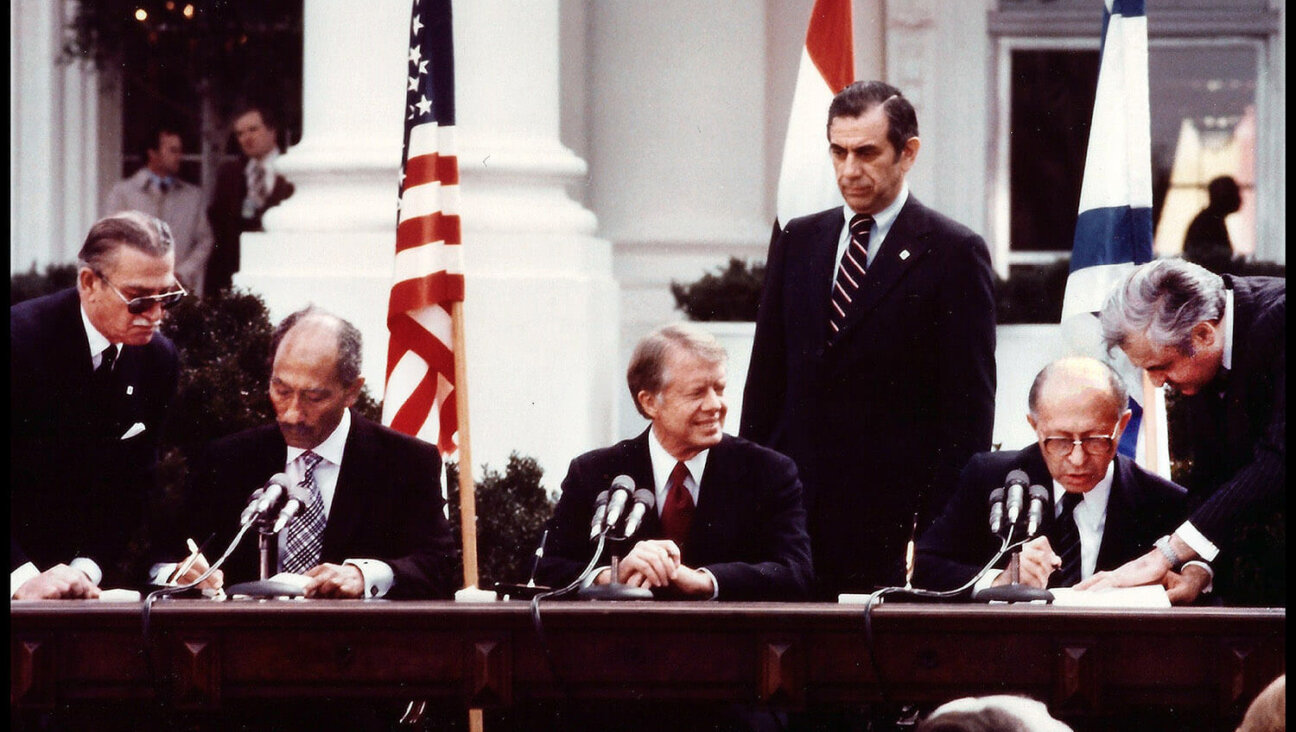Streams Unite To Fight Ministry on Conversion
In a rare moment of cross-denomination solidarity, Reform and Conservative rabbis in Israel are joining their Orthodox colleagues in opposing an Interior Ministry move to end automatic citizenship for those who convert to Judaism in Israel.
The Interior Ministry, led by the anti-clerical Shinui Party, announced plans this week to allow the expiration of a policy that confers citizenship immediately on anyone who completes a conversion in Israel. The policy is based on the Law of Return and in practice grants citizenship only to those who underwent Orthodox-sanctioned conversions.
The non-Orthodox movements, whose converts were never privy to the citizenship concession to begin with, initially lauded the move as an important step toward granting equal rights to Israel’s liberal religious streams. But they turned against the liberal interior minister, Avraham Poraz, after he stated that he also was against automatically approving temporary residency for converts while they wait to become citizens.
Liberal and Orthodox streams agree that the move would deny legitimate Jewish converts the rights accorded to other Jews.
“It basically says a convert doesn’t have a right to live in Israel,” said Nicole Maor, the director of legal aid to new immigrants at the Israel Religious Action Center of Reform Judaism. “If you disconnect the rights to stay in a country for anyone who is Jewish, convert or not convert, you’re undermining the basis of Israel as a Jewish and democratic state.”
Orthodox political leaders lashed out even more vigorously at Poraz. Housing Minister Effi Eitam, chairman of the right-wing National Religious Party, called on the prime minister to revoke Poraz’s authority to issue Israeli citizenship.
The interior ministry’s proposal was laid out in a May 18 petition to Attorney General Elyakim Rubenstein. Under the plan, eligibility for citizenship, residency or any other “civil rights” would be based on the applicant’s “contributions to the society, identity with the Zionist movement or humanitarian grounds, without any relation to the question of religion and conversion.”
Poraz’s proposal does not affect a 1988 landmark Supreme Court ruling that bestows citizenship automatically on immigrants who arrive in Israel after undergoing conversion under the auspices of a recognized Jewish community abroad.
Poraz’s petition states that the proposal is meant to guard against mass conversion by foreign workers from third world countries who are seeking citizenship to improve their living conditions.
A top leader of Israel’s Conservative movement, Rabbi Andrew Sacks, said he found the proposal’s position on converts’ rights to residency “extremely problematic.” He also took issue with Poraz’s assumption that there is a potential for abuse within the conversion process. Sacks insisted that the process was highly regulated by rabbis and was not subject to abuse by foreign workers. Despite his criticism, Sacks, director of the Rabbinical Assembly in Israel, said Poraz’s citizenship proposal makes “some positive gestures in the right direction.”
Moaz of the Reform movement said she was especially offended by a paragraph in the proposal that suggests that a “less suspicious” attitude be adopted toward applicants from “developed” nations than from “third world” countries because, as the proposal explains, “those who come from developed countries have less reason to want to live in Israel for economic reasons.”
“He has no mandate to say he prefers a wealthy American non-Jew to a poor Ethiopian Jew,” she said.
The petition was drafted in response to an ongoing case in the Supreme Court brought by foreigners who converted in Israel and were refused citizenship. Although the call to abolish all automatic citizenship was approved in December by the interior minister of the last government, Poraz took it one step further by seeking to deny converts any special status. Rubenstein is expected to reject the proposal.
According to some observers, Poraz’s proposal appears to be an effort to inject separation of religion and state into Israel’s citizenship laws.
In an interview with the Forward the day before the letter’s release, a spokesman for the interior ministry, Tibi Rabinovici, said Poraz is motivated mainly by a resolve to mark a separation between the ministry’s power to grant citizenship and the Orthodox chief rabbinate’s authority to approve conversions.
“The [interior] minister is not the chief rabbi of Israel,” Rabinovici told the Forward. “The chief rabbinate of Israel could give someone the authorization to be a Jew. The minister is in charge of granting citizenship.”
“If someone is a Jew who comes from outside, he’ll get citizenship like he did before,” Rabinovici continued. “But if someone is being converted in Israel, this is not going to be an easy way to get citizenship. He is going to get citizenship if he is a good ‘citizen,’ but not if he’s a good Jew.”
“We don’t want to oblige people who want Israeli citizenship to be a Jew,” Rabinovici added.
Members of the Reform and Conservative movements currently have no citizenship rights above those of non-Jews in Israel. According to Sacks, however, an agreement was struck between the non-Orthodox streams and the national population registry to allow persons who converted or who are studying to convert to remain in Israel until the Supreme Court rules on this issue. But Sacks claims that even temporary assurance is not being honored.
According to some in the government, the proposal could be approved only through an act of the Knesset. One top figure in the National Religious Party, Yitzhak Levy, the deputy minister of religious affairs, warned that one of the agreements holding the coalition government together requires that one “cannot change any of the laws related to religion without agreement with all parties in the coalition.”
A message from our Publisher & CEO Rachel Fishman Feddersen

I hope you appreciated this article. Before you go, I’d like to ask you to please support the Forward’s award-winning, nonprofit journalism so that we can be prepared for whatever news 2025 brings.
At a time when other newsrooms are closing or cutting back, the Forward has removed its paywall and invested additional resources to report on the ground from Israel and around the U.S. on the impact of the war, rising antisemitism and polarized discourse.
Readers like you make it all possible. Support our work by becoming a Forward Member and connect with our journalism and your community.
— Rachel Fishman Feddersen, Publisher and CEO






















